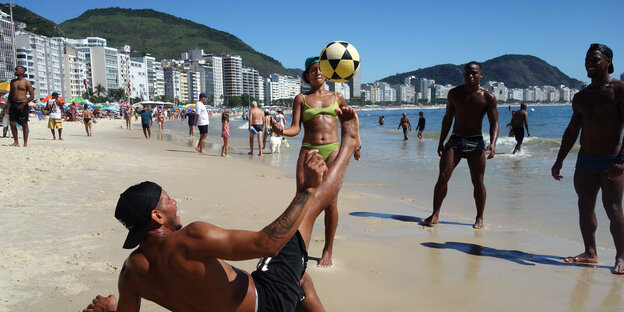In Germany the show “Big Brother” is something old, in Brazil it is a mass phenomenon. The reality show shows the country as if through a magnifying glass.

To Glozue like everyone else or do you prefer to go to the beach? Copacabana beach in Rio de Janeiro Photo: Bob Karp/imago
On Monday afternoon I sat in front of the television in Rio. Admittedly, I didn't actually plan to do that. Midsummer, 30 degrees, why stay home? But I couldn't escape the spectacle that many of my friends had been waiting for for weeks. That night the most successful reality show in the country began: Big Brother Brazil.
In Germany, the show is a relic of the 1990s. It is not like that in Brazil. Here BBB, as it is popularly known, is a massive event, it has higher ratings than soccer matches, the news and even the beloved soap operas. Dubbed by critics as a brutalization of the people and an infomercial, BBB is more than that: a microcosm of Brazilian society and, in some ways, also a thermometer for the state of the country.
If you don't know the format: a group of participants is locked in a house for about three months and monitored 24 hours a day by cameras. There is no contact with the outside world, nor access to social networks. In addition to normal Brazilians, there are also some C and D celebrities, this year for example Baile Funk singer MC Bin Laden. Residents must pass exams and master daily life at home. The spectators decide who leaves the house. Whoever is left standing at the end wins and receives a considerable cash prize.
BBB runs on Globo. Every night, the television channel of the largest media company in South America offers the best moments of the day. If you pay more, you will be able to monitor the residents 24 hours a day. The first season aired in 2002 and the show has broken many records since then. This also has to do with social networks. Almost nowhere else do they have as many users as in Brazil. Short video clips of the house are uploaded to X and Instagram and spark heated debates there. Brazilians love it flabbythe gossip.

This text comes from Laborable day. Our left-wing weekly! Every week, wochentaz is about the world as it is and as it could be. A left-wing weekly with a voice, attitude and a special vision of the world. New every Saturday on newsstands and of course by subscription.
It would probably be going too far to claim that Brazilians with their BBB love have a chronic tendency to escape reality. But especially in recent years, for many people the spectacle has been at least a temporary distraction from the chaos of the coronavirus and the economic crisis.
BBB is a microcosm of Brazilian society
What makes the show so exciting: it's a mini version of this gigantic and often contradictory country. Almost everyone can see themselves in one of the candidates: the macho cowboy from the south, the favela resident of Rio de Janeiro, the gay fashion designer from São Paulo. The production strives to invite people of different backgrounds, ages, professions, personalities and political views. The fact that things are not always harmonious is a central hallmark of the show. Debates about politics, religion and sexuality are often noisy.
Given the program's nationwide popularity, it is not surprising that several candidates tried their luck in politics. The best known of them is called Jean Wyllys, winner of the fifth season. From 2011 to 2019 he was a deputy for the leftist party PSOL. With the openly gay politician and activist, LGBTI issues moved into Brazilian homes and reached many more people than any demonstration would have achieved.
The show will last another three months. For many Brazilians, a short break probably won't begin until mid-February. Then the carnival begins, and they love it even more than Big Brother.